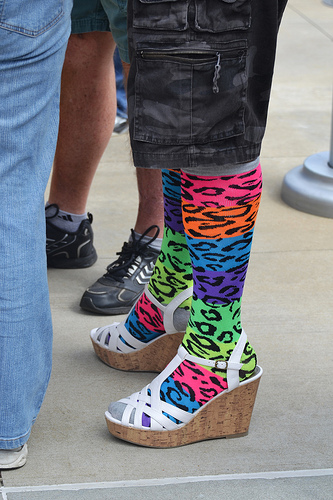Can you get in trouble for cross dressing at school?

In recent years, school dress codes have come under attack while students cross dressing at school, girls wearing tuxes and boys wearing dresses to the prom and supporting LGBT rights and causes with shirts and accessories have gained popularity. Whether you can get in trouble for wearing something that violates your school’s sex-specific dress code is going to depend on a number of factors including the specifics of your case (what is being worn, when and where?), the school dress code and the laws in your state.
The law concerning school dress codes
Generally, dress codes must be enforced equally and fairly against all students and not violate any constitutional rights such as the First Amendment freedom of speech or equal protection under the 14th Amendment. That being said, if the school believes that a student’s attire either infringes on the rights of other students or may materially or substantially disrupt the school environment, they may restrict the student from wearing such clothing.
Sex-specific dress codes
Schools open the door to legal challenges when enforcing dress codes based on gender such as prohibiting boys (but not girls) from wearing earrings. Discrimination based on sex is illegal and this type of gender specific dress code could be thrown out in court if found to violate the Constitution or Title IX. However, some courts have found that such sex-specific distinctions are legal due to school concerns about safety, discipline, distraction from learning, and/or promoting community values. The setting and age of the students may be considered. Prohibiting boys from wearing dresses at school may be legally justifiable in an area where such cross dressing would substantially disrupt the learning environment. However, the same argument may be difficult to make and defend when restricting boys from wearing dresses to the prom where the learning environment is not an issue.
Dress code case
When a case goes to court, judges apply the Tinker test to determine if a student’s rights have been violated (did the outfit or conduct cause a substantial disruption of the school environment or was there a likelihood of such). One court ruled that the school could not restrict a male transgender student (biologically male, but psychologically identifies as female) from wearing girls’ clothing to school as there was no evidence that his manner of dress caused a substantial disruption.*
If you are thinking about cross dressing at school or are curious about your school’s rules and policies, check your Student Handbook to see what it says about the dress code.
Update: In May, 2013, the American Psychiatric Association replaced its classification for transgender people as “gender identity disorder” with “gender dysphoria” reflecting a new understanding that one who identifies with one gender that doesn’t match your birth anatomy is not a mental illness. Over 600 colleges and universities in the U.S. have adopted nondiscrimination policies to cover gender expression. However, high schools and middle schools are struggling with these issues when it comes to locker rooms, bathrooms and athletic fields. California, Maine, Oregon and Massachusetts have made gains in this area.
* Doe v. Brockton Sch. Comm., 2000WL 33342399 (Mass. App. Ct. Nov. 30, 2000).




A friend of mine was told to take his dress off. Even though he’s not trans, it was to prove a point in a class. His dress wasn’t distracting, but the school still made him change. Honestly, it was unfair. If he was trans or left he was a women, it’d be unfair and throw the school into an uproar because it’s discrimination. My friend is of a different race, so obviously it’d look racist. I just wish schools would change their mindsets. Most of society has, why can’t they?
Dear Madison: If your friend believes that his rights (either equal protection or free speech rights) were violated, he could try contacting his local ACLU office (American Civil Liberties Union). These offices have intervened in a number of students’ rights cases including ones that may have involved dress codes. Here is the link to the ACLU affiliates page and then he could click on his state to find out more. Good luck to him.
(Check our Teen Help Network for more help and resources in your area. This is information only – not legal advice.)
I think anybody can wear anything as long as they’re comfortable with it. In additional, as long as it’s not something that they can use it as a weapon. On the bright side of dress code as the school wants it, it makes the student look professional rather than someone who just go to school for fun.
Thank you for your comments, Jackie.